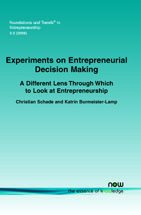Experiments on Entrepreneurial Decision Making: A Different Lens Through Which to Look at Entrepreneurship
By Christian Schade, Humboldt-Universität zu Berlin, Germany, cds@wiwi.hu-berlin.de | Katrin Burmeister-Lamp, Humboldt-Universität zu Berlin, Germany, katrin.burmeister-lamp@wiwi.hu-berlin.de
Abstract
In this paper, we propose that researchers might analyze key questions in entrepreneurship as problems of decision making. We believe that this allows for new insights. Experiments are especially suited to empirically test hypotheses derived within such a framework. In this paper, we thus introduce the decision-making perspective as well as general characteristics of the experimental method. We also discuss existing experimental studies in entrepreneurship with respect to the use of a decision-making perspective and specifics of their experimental designs. Finally, we present "research cases" that demonstrate the shift in perspective that occurs when common questions in entrepreneurship are analyzed through the lens of decision making. We conclude that entrepreneurial decision making (EDM) bears the potential of a scientific paradigm. This paper is intended to stimulate theory development to establish such a paradigm and (experimental) research within the perspective of EDM.
Experiments on Entrepreneurial Decision Making
Experiments on Entrepreneurial Decision Making provides a perspective that has the potential of being applied to many research questions in entrepreneurship. Some of these questions include: How do entrepreneurs raise capital? How do entrepreneurs manage rapid growth? What impact do networks have on entrepreneurial phenomena? What is the role of corporate entrepreneurship? Experiments on Entrepreneurial Decision Making defines the structure of a decision-making process including examples, suggests a classification of experiments, explains different experimental designs, describes quality criteria of experiments and addresses the differences between economic and psychological experiments. The authors discuss existing experimental work on entrepreneurial decision making and develop three 'scientific cases' starting with existing theory, delineating the decision-making approach on the respective problems, and developing experimental designs to analyze the resulting questions. The final chapter addresses the question whether EDM might have the potential for becoming a research paradigm and how applying this perspective might contribute to the development of knowledge in entrepreneurship.
